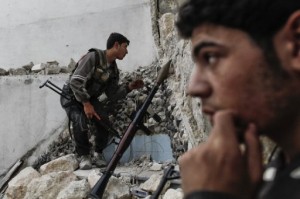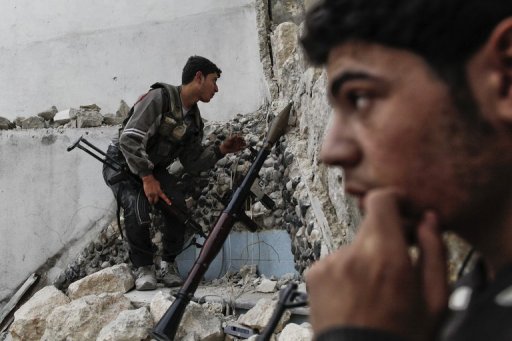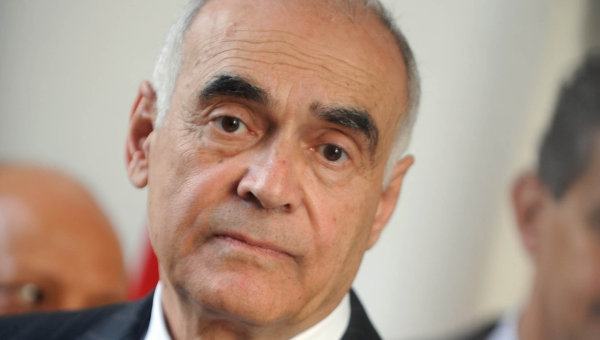
By Jennie Matthew (AFP) – Munzir is still a teenager but he’s already a veteran of the Syrian war. He fought in his hometown, driving out regime soldiers, and is now trying to do the same in Aleppo.
Except that winning Aazaz only took a couple of weeks.
More than three months after moving into Syria’s commercial capital, rebels lay claim to a patchwork of Sunni Arab neighbourhoods dotted across the north, south and east of Aleppo.
The fighting lays bare their inability to capture a metropolitan city with limited weapons unknown to many of the fighters and to win over some 2.5 million residents to a rebellion increasingly hijacked by an Islamist agenda.
“It’s a very different fight here,” conceded Munzir as he got ready to go home on leave for 48 hours after two months’ fighting.
“People in Aazaz worked with us and respected us, but here half the people don’t protect us and don’t like us,” he said.
None of the 12 men in his unit come from Aleppo, which makes it all the harder to fight urban warfare in such a large, unknown city.
Armed only with homemade bombs, Kalashnikovs, RPGs and machineguns, it’s a painful fight, inch by inch. Munzir says his last operation ended in retreat after one fighter was killed and four others were wounded.
An AFP team watched last week as it took an hour and 10 minutes to prepare and then take out a regime sniper position — essentially blowing up one storey of an apartment block.
Abu Mohammed, a charismatic and respected commander in Aleppo who claims to command 350 to 400 fighters under the United Salam Brigades, concedes there is a lack of indigenous recruits in some units.
Sitting in olive groves where he is training men for commando operations, he blames the problem on so many people fleeing Aleppo when the fighting started, and clerics and businessmen in the city who he says support the regime.
Air strikes and shelling have destroyed families, devastated homes and ruined businesses. Mushrooming piles of rubbish lie rotting in the streets.
People complain about power cuts, food shortages, rising fuel prices, losing their jobs and of course, they are frightened.
But in rebel-held areas, few if any openly criticise the Free Syrian Army (FSA), the main armed group fighting to bring down President Bashar al-Assad.
At a checkpoint behind the frontline, a woman arrived in tears from a visit to her daughter’s home, which the family abandoned in haste under fire.
“I came to have a look and found everything stolen,” she sobbed, clutching a few bags of children’s winter clothes.
The FSA offered little comfort other than putting her in a taxi and discouraging AFP from asking her questions.
“We don’t know everyone here,” shrugged one of the fighters.
In the next street, retired Armenian teacher Kohareen ignored FSA calls to evacuate. In her 60s, she says she has nowhere else to go.
Bombed-out buses seal off sniper alleys and Islamist graffiti has been sprayed onto buildings of what was once a thriving, Muslim-Christian community.
“We want peace for everyone, for everyone to come back home. Life was good. We were comfortable,” she said. With a rebel gunman standing below, she added: “God willing the FSA will protect us.”
She went back inside and defected lieutenant, Ahmed Saadeen, 24, burst into complaints about why the city was taking so long to capture.
“The problem in Aleppo is the people. It’s as if they don’t care. For one month I haven’t been home on leave, so how can they celebrate (the recent Muslim holiday of) Eid while people are dying?” he said.
Experts say the battle for Aleppo will be protracted given the rebels’ shortage of heavy weapons and with the regime keen to avoid the international condemnation that would come from inflicting major massacres.
Marwa Daoudy, a lecturer in international relations at Oxford University, says Aleppo reflects the stalemate in the rest of the country, but that its urban elites set it apart from disadvantaged towns easily captured by the rebels.
The merchant class, Christians and Muslims, have prospered since the economic reforms of 2005, she said.
Although they have become much more critical of the regime, many people are nervous about insecurity and the future as the Islamist agenda promoted by some of the rebel groups has hijacked the uprising.
“Clearly the basis for the FSA is very much in the poorer areas and so far in the last year and a half the heart of Aleppo had been very much outside the conflict except protests at the university,” Daoudy told AFP.
“On the Christian side, they’re worried about the post-Assad period in terms of the treatment of minorities, but the Sunnis are divided.
“People are fearing now for their security and the future of the country. People also don’t know who some of the insurgents are and what their agenda is,” she said.



